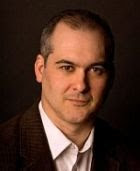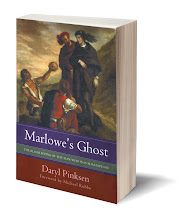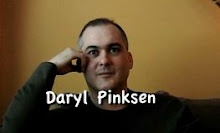Saturday, August 28, 2010
On the Nature of Evidence
Is there any evidence that Christopher Marlowe may have written the works of Shakespeare? It depends on the kind of evidence. I will say that there is no direct evidence for Marlowe’s authorship of the works of Shakespeare (and lots against him), and plenty of direct evidence for Shakespeare the Stratford shareholder (with little or none against him). However, I would also argue that there is indirect evidence for Marlowe, but agreement on how indirect evidence is interpreted depends on one's perspective and underlying assumptions.
Here's an example which demonstrates my point and also neatly discusses the early play Titus Andronicus, the idea of Shakespeare's apprenticeship, and the extent of the writer's education evident in the texts. In Jonathan Bate's "Shakespeare and Ovid", Bate discusses the adundant evidence of classicism in Titus Andronicus and compares it to similar evidence in Venus and Adonis:
"Muriel Bradrook has convincingly argued that Shakespeare wrote Venus and Adonis partly in response to Greene’s ‘upstart crow’ quip—the Stratford lad decided to show that he could outdo the Oxbridge men in that most sophisticated of genres, the Ovidian erotic narrative. Titus [Andronicus] is also beautified with the feather of classicism—and with a vengeance. If we posit an early date for the play we may consider it as a provocation for Greene; if a later one, as a response to him. . . "
Here's where it gets interesting . . .
"This then, is the additional force of Capell’s point: precisely because Shakespeare had less formal education than certain other dramatists, his play has more display of learning."1
Bate's conclusion may be true, but it is, nonetheless, circular reasoning. Bate illustrates the point that observations are weighed as potential evidence against initial assumptions. For example, I might take Bate's observation as indirect evidence that the writer of Titus had as much--or more--formal education than the other dramatists. But Bate sees it as indirect evidence of exactly the opposite: The fact that Titus is so thoroughly shot through with classicist veins -- not in a way which equals the university educated dramatists, but surpasses them - is interpreted by Bate as a psychological consequence (an inferiority complex?) of Shakespeare having less formal education, not as a natural consequence of its author actually having more formal education.
To paraphrase James Shapiro: in the rock, paper, scissors world of evidence, direct evidence (such as eye-witness testimony) trumps indirect evidence (like finger-prints). Shakespeare's name on the cover pages therefore trumps the presence of Marlowe's literary finger-prints all over the work.2
Daryl Pinksen
1 Bate, Jonathan. 1993. Shakespeare and Ovid. Oxford: Clarendon Press. p. 102
2 I also regard this observation as possible indirect evidence for Marlowe: "The fingerprints of Tamburlaine are all over the plays that are among Shakespeare’s earliest known ventures as a playwright." (Greenblatt, 2004, p.192). Greenblatt however would regard it as evidence that Shakespeare watched Tamburlaine over and over until he began, consciously and unconsciously, sounding like Marlowe in his own work.
Wednesday, August 25, 2010
Shakespeare, poet of nature?
The presumed differences between Shakespeare's work, and the work of the university educated, is a point scholarship is at great pains to address without apparent contradiction.
The work of Shakespeare is full of classical allusions. Yes, we know that large chunks of Ovid and other Roman writers were memorized at the grammar schools. By way of analogy, fourteen year olds today study Shakespeare (let's confine this to the gifted) in and before grade nine. But, it's also studied at the university by twenty year olds. The top students who study Shakespeare in grade nine have a vastly inferior appreciation of the works than the top students who studied the same works at university.
At age fourteen, which was the senior level at the grammar schools, the abstract reasoning centers of the brain have barely switched on, even in the brilliant. It's a question of cognitive maturation, not IQ.
Shakespeare understood Ovid, and the rest of the classical world, at the same depth and breadth as our top university graduates understand Shakespeare, not in the way that our top grade nine graduates understand Shakespeare.
That doesn't mean it's impossible for Shakespeare to have achieved a level of Ovidian scholarship equal to the university elites, it does mean that it is incumbent upon scholars to explain how it "could" have happened, since, we are told, it did.
Friday, August 20, 2010
New Article at the MSC Blog
THURSDAY, AUGUST 19, 2010
Malcolm Gladwell's Outliers: Implications for Shakespeare Biographersby Daryl Pinksen
In Malcolm Gladwell’s recent book,Outliers: The Story of Success , the author argues that top-level mastery of any discipline cannot be achieved without sustained and concerted effort, usually from an early age, until something like ten thousand hours of focused practice have been logged. Gladwell’s goal is to expose as Romantic delusion the notion that “outliers,” his word for individuals who achieve world-class mastery, are the outcome of geniuses inevitably rising to the top—often in spite of their environment. In Outliers, Gladwell marshals a chorus of evidence to make his case. (Continue to article)
, the author argues that top-level mastery of any discipline cannot be achieved without sustained and concerted effort, usually from an early age, until something like ten thousand hours of focused practice have been logged. Gladwell’s goal is to expose as Romantic delusion the notion that “outliers,” his word for individuals who achieve world-class mastery, are the outcome of geniuses inevitably rising to the top—often in spite of their environment. In Outliers, Gladwell marshals a chorus of evidence to make his case. (Continue to article)
Subscribe to:
Posts (Atom)





